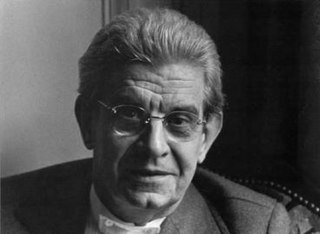A Quote by Jacques Lacan
Which is why we cannot say of the purloined letter that, like other objects, it must be or not be in a particular place but that unlike them it will be and not be where it is, wherever it goes.
Related Quotes
The camera machine cannot evade the objects which are in front of it. When the photographer selects this movement, the light, the objects, he must be true to them. If he includes in his space a strip of grass, it must be felt as the living differentiated thing it is and so recorded. It must take its proper but no less important place as a shape and a texture in relationship to the mountain tree or what not, which are included.
My high school English teacher in junior year, Dr. Robert Parsons, assigned us some Poe stories, including 'The Black Cat' and 'The Purloined Letter.' Being an animal person, I had trouble with 'The Black Cat!' I got hooked instead by 'The Purloined Letter,' a Poe story with detective C. Auguste Dupin.
I cannot afford to believe that freedom from intolerance is the right of only one particular group. And I cannot afford to choose between the fronts upon which I must battle these forces of discrimination, wherever they appear to destroy me. And when they appear to destroy me, it will not be long before they appear to destroy you.
Wherever I go it will be well with me, for it was well with me here, not on account of the place, but of my judgments which I shall carry away with me, for no one can deprive me of these; on the contrary, they alone are my property, and cannot be taken away, and to possess them suffices me wherever I am or whatever I do.
I do not define time, space, place, and motion, as being well known to all. Only I must observe, that the common people conceive those quantities under no other notions but from the relation they bear to sensible objects. And thence arise certain prejudices, for the removing of which it will be convenient to distinguish them into absolute and relative, true and apparent, mathematical and common.
We must not allow ourselves to become like the system we oppose. We cannot afford to use methods of which we will be ashamed when we look back, when we say, '...we shouldn't have done that.' We must remember, my friends, that we have been given a wonderful cause. The cause of freedom! And you and I must be those who will walk with heads held high. We will say, 'We used methods that can stand the harsh scrutiny of history.'
If the majority of people said I did something wrong, then I must be wrong, and I will think 'I didn't even mean it like that, why are you treating me like this?' But if a lot of people say that I'm wrong and it's not good, then it must be not good. I will say, 'Okay' and then tell myself that this cannot happen again. I have to grasp it and change it for the better.
The only way of expressing emotion in the form of art is by finding an "objective correlative"; in other words, a set of objects, a situation, a chain of events which shall be the formula for that particular emotion; such that when the external facts, which must terminate in sensory experience, are given, the emotion is immediately evoked.
This is community land that belongs to particular clans, and therefore, it must go back and its administration and the determination as to what to do, must rest in the hand of the communities. That is why you have these committees, among whose members, of course, they will be traditional leaders. You will have these collectives, which must then deal with the land, the issue of communal rights.
There is never a sudden revelation, a complete and tidy explanation for why it happened, or why it ends, or why or who you are. You want one and I want one, but there isn't one. It comes in bits and pieces, and you stitch them together wherever they fit, and when you are done you hold yourself up, and still there are holes and you are a rag doll, invented, imperfect. And yet you are all that you have, so you must be enough. There is no other way.
It was pleasant to me to get a letter from you the other day. Perhaps I should have found it pleasanter if I had been able to decipher it. I don't think that I mastered anything beyond the date (which I knew) and the signature (which I guessed at). There's a singular and a perpetual charm in a letter of yours; it never grows old, it never loses its novelty. Other letters are read and thrown away and forgotten, but yours are kept forever - unread. One of them will last a reasonable man a lifetime.






































